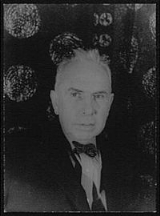
school. His novels often featured main characters who succeeded at their objectives despite a lack of a firm moral code, and literary situations that more closely resemble studies of nature than tales of choice and agency.
Some of Dreiser's best known novels include Sister Carrie
(1900) and An American Tragedy
(1925).
Dreiser was born in Terre Haute, Indiana
, to Sarah and John Paul Dreiser, a strict Catholic family.
Our civilization is still in a middle stage — scarcely beast in that it is no longer wholly guided by instinct; scarcely human, in that it is not yet wholly guided by reason.![]()
"The most futile thing in this world is any attempt, perhaps, at exact definition of character. All individuals are a bundle of contradictions — none more so than the most capable."
![]()
"A man, a real man, must never be an agent, a tool, or a gambler – acting for himself or for others – he must employ such. A real man – a financier – is never a tool. He uses tools. He creates. He leads."
![]()
"Innate sensuousness rarely has any desire for accuracy, no desire for precise information. It basks in sunshine, bathes in color, dwells in a sense of the impressive and the gorgeous, and rests there. Accuracy is not necessary except in the case of aggressive, acquisitive natures, when it manifests itself in a desire to seize. True controlling sensuousness cannot be manifested in the most active dispositions, nor again in the most accurate."
![]()
"Few people have the sense of financial individuality strongly developed. They do not know what it means to be a controller of wealth, to have that which releases the sources of social action – its medium of exchange. They want money, but not for money’s sake. They want it for what it will buy in the way of simple comforts, whereas the financier wants it for what it will control for what it will represent in the way of dignity, force, power."
![]()
"The Irish are a philosophic as well as a practical race. Their first and strongest impulse is to make the best of a bad situation – to put a better face on evil than it normally wears."
![]()
"The conventional mind is at best a petty piece of machinery. It is oyster-like in its functioning, or, perhaps better, clam-like. It has its little siphon of thought-processes forced up or down into the mighty ocean of fact and circumstance; but it uses so little, pumps so faintly, that the immediate contiguity of the vast mass is not disturbed. Nothing of the subtlety of life is perceived. Not least inkling of its storms or terrors is ever discovered except through accident."
![]()

